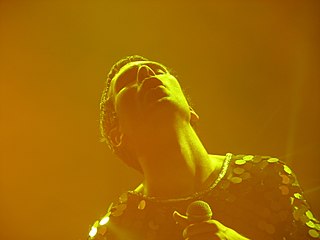A Quote by Jamie Lidell
All kinds of music comes out that I'm not prepared for. Some of it is good, some of it rubbish, but I kind of accept it all. That's the nature of stream-of-consciousness. You can't always come up with your most lucid material in the heat of the moment. I take that risk when I play live. I open up my mind, however fertile a creative springboard it is that evening.
Related Quotes
These are the things I learned: share everything, play fair. Don't hit people. Put things back where you found them. Clean up your own mess. Don't take things that aren't yours. Say you're sorry when you hurt somebody. Wash your hands before you eat. Warm cookies and cold milk are good for you. Live a balanced life. Learn some and think some and draw some and paint and sing and dance and play and work some every day. Take a nap every afternoon, and, when you go out into the world, watch for traffic, hold hands, and stick together.
The moment you frame your own awareness within a second level of self -consciousness is the moment your mind is most up for grabs. ... You're safe because you have an ironic distance from the coercive techniques I'm employing. All of them that is, except this one. Are you on your guard yet? Does it feel good? Of course not.
Consciousness... does not appear to itself chopped up in bits. Such words as 'chain' or 'train' do not describe it fitly as it presents itself in the first instance. It is nothing jointed; it flows. A 'river' or a 'stream' are the metaphors by which it is most naturally described. In talking of it hereafter, let us call it the stream of thought, of consciousness, or of subjective life. Source of the expression 'stream of consciousness'.
I didn't write any music at all, and then, I remember Jon Anderson being very insistent saying that there were two kinds of musicians: the ones who wrote music and the ones who didn't. And clearly the ones who wrote music were more superior human beings in his mind. So he kind of nudged me and sort of prodded me into it. I picked it up slowly. Then I learned more about chords and harmony and I just kept adding to that. One of the great things about having good players in your band is that you just ask them questions. You can pick up some good information that way.
Our bodies are garbage heaps: we collect experience, and from the decomposition of the thrown-out eggshells, spinach leaves, coffee grinds, and old steak bones out of our minds come nitrogen, heat, and very fertile soil. Out of this fertile soil bloom our poems and stories. But this does not come all at once. It takes time. Continue to turn over and over the organic details of your life until some of them fall through the garbage of discursive thoughts to the solid ground of black soil.
Our society values alert, problem-solving consciousness, and it devalues all other states of consciousness. Any kind of consciousness that is not related to the production or consumption of material goods is stigmatized in our society today. Of course we accept drunkenness. We allow people some brief respite from the material grind. A society that subscribes to that model is a society that is going to condemn the states of consciousness that have nothing to do with the alert problem-solving mentality.
He says, you have to study and learn so that you can make up your own mind about history and everything else but you can’t make up an empty mind. Stock your mind, stock your mind. It is your house of treasure and no one in the world can interfere with it. If you won the Irish Sweepstakes and bought a house that needed furniture would you fill it with bits and pieces of rubbish? Your mind is your house and if you fill it with rubbish from the cinemas it will rot in your head. You might be poor, your shoes might be broken, but your mind is a palace.
Within a year after I write a play I forget the experience of having written it. And I couldn't revise or rewrite it if I wanted to. Up until that point, I'm so involved with the experience of having written the play, and the nature of it, that I can't see what faults it might have. The only moment of clear objectivity that I can find is at the moment of critical heat - of self-critical heat when I'm actually writing.



































